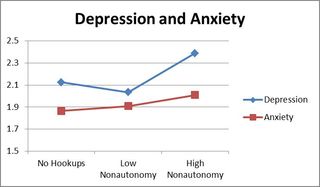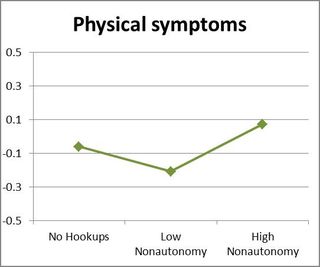Sex
Is Casual Sex Hazardous to Your Mental Health?
New research shows that the reasons you do it make all the difference.
Posted February 21, 2014 Reviewed by Matt Huston

Casual sex gets a bad rep. Although most young people have at least one hookup under their belts, many fear this is detrimental to their psychological well-being. Scholars, health professionals, and the media alike have all expressed concerns that hooking up leads to depression, anxiety, or low self-esteem. Many studies over the past decade have tried to answer this question, but the results have been very mixed. Now, a study published in the Archives of Sexual Behavior suggests that it’s not so much whether you have casual sex that impacts your mental health, it’s why you do it.
Studies of casual sex and well-being usually go like this: Take the people with at least one hookup and compare their well-being to the people who’ve never had a hookup. There are now about 20 such studies and the results are all over the place. Sometimes the hookup group has higher depression or lower self-esteem than the no-hookup group (particularly among women), other times the hookup group has lower depression and higher self-esteem (particularly among men), and very often there are no differences between the two groups.
Such mixed results often means that the relationship between the two things you’re studying (in this case, casual sex and well-being) is not straightforward. It is likely that not all hookups have the same potential to harm or benefit well-being and not all people engaging in them are equally susceptible to that harmful or beneficial potential. Instead, there are individual, interpersonal, and social factors that this relationship depends on.
Enter motivation. Motivation is a powerful thing. Extensive research guided by self-determination theory, a well-established theory of human motivation and personality, shows that when we do things for the “right” reasons, our well-being flourishes. When we do those exact same things for the “wrong” reasons, our well-being suffers. What are right and wrong reasons? Right, or autonomous, reasons are self-directed and reflective of our values. Wrong, or nonautonomous, reasons are about seeking rewards and avoiding punishments (whether internal or external) or complete lack of motivation.
Here are some examples of autonomous and nonautonomous motives for casual sex.
Autonomous (“Right”) motives:
- Wanting the fun and enjoyment.
- Wanting to explore and learn about your sexuality.
- Believing it is an important experience to have.
Nonautonomous (“Wrong”) Motives:
- Wanting to feel better about yourself or to avoid other unpleasant feelings.
- Wanting to please someone else (e.g., your partner or friends).
- Wanting to get a favor, material reward, or revenge.
- Hoping it would lead to a long-term relationship.
- Not actually wanting to hook up, but being somehow tricked or coerced into it, or too intoxicated to make a responsible decision.
Decades of research have demonstrated that the motivation–well-being link holds true for pretty much any human behavior, from studying, to exercising, to helping. Casual sex shouldn’t be an exception. So I set out to examine this in a sample of 530 undergraduates surveyed twice during the academic year.

After statistically controlling for demographics, personality traits, prior casual and romantic sex, and well-being at the beginning of the academic year, I found that whether or not students hooked up during the course of the year was not related to their well-being at the end of the year. However, whether they did it for nonautonomous motives was.
Those who hooked up for the wrong reasons (High Nonautonomy group) had lower self-esteem, higher depression and anxiety, and more physical health symptoms compared to those who didn’t hook up. Those who hooked up but not for the wrong reasons (Low Nonautonomy group) had higher self-esteem and similar levels of depression, anxiety, and physical symptoms compared to those who didn’t hook up.

Surprisingly, autonomous motivation was unrelated to well-being. What’s more, there were very few gender differences. Men and women were remarkably similar in the extent to which they hooked up for autonomous and nonautonomous reasons, and in the way their hookup motivations were related to well-being.
So next time you have a chance to have casual sex, think about why you're doing it. If it feels like you're doing it for the wrong reasons, stop. Your mental health may depend on it.
Have a casual sex story to share with the world? That's what The Casual Sex Project is for. Follow me on Twitter @DrZhana for daily updates on the latest in sex research.
References
Vrangalova, Z. (2014). Does casual sex harm college students’ wellbeing? A longitudinal investigation of the role of motivation. Archives of Sexual Behavior. doi:10.1007/s10508-013-0255-1




